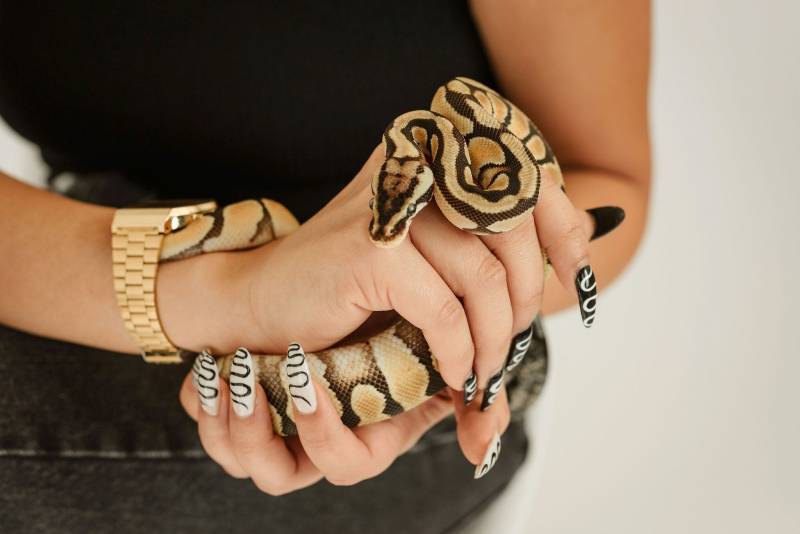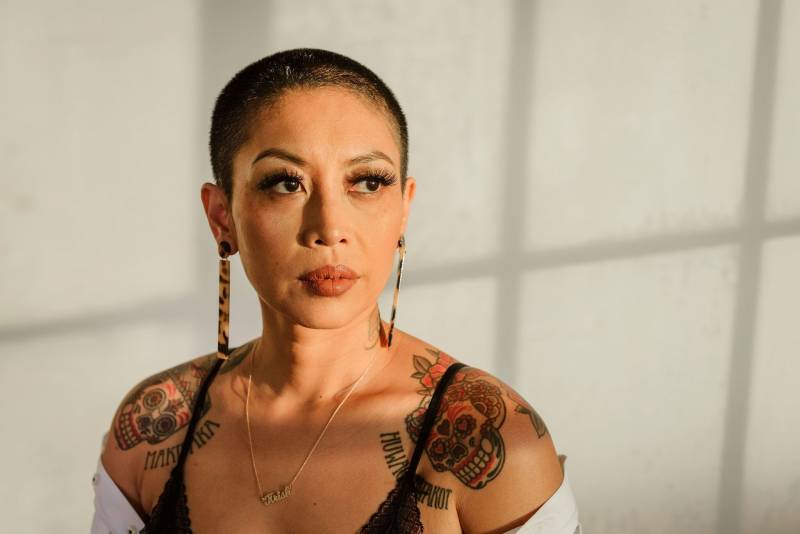After winning an MTV reality TV show contest about a dozen years ago, Rocky Rivera landed a gig at Rolling Stone. That was a crowning moment in her career as a journalist.
Since then, Rocky Rivera’s enjoyed a successful musical career and expanded her world as an educator in Oakland public schools. Most recently she published an autobiographical collection of essays, Snakeskin, which takes a look back at her storied career and personal life.
Rocky Rivera, who was raised in San Francisco, uses the book to express the importance of restorative justice practices. Addressing conflict without using punitive models is something that works in the classroom and the community, as well as in art.
A major part of restorative justice is being accountable for past actions, and growing out of those behaviors in order to come anew. Rocky Rivera likens that process to a snake shedding its skin– it also parallels her process of going through a period of personal, artistic and spiritual growth. Thus, snakeskin is a multilayered term.
This week, I talk to Rocky Rivera about family, community, accountability and growth.

Below are lightly edited excerpts of my conversation with Rocky Rivera.
Pen: Part of restorative justice is identifying when you’ve been wronged. A few of your essays point out unnamed people who have caused harm. They’re academics who used your labor for free, community members who made hollow promises and festival organizers who shortchanged you on performance time…. You were getting some heat off your chest. Bring me into your thinking behind those essays.
Rocky Rivera: I feel like my story and my voice is all I really have, and when these people are in positions of power – which every single person that I called out was in a position of power – well then I have the right to speak on how that that power was either manipulated or abused or taken advantage of.
Rocky Rivera: In the academic system, there is this reliance on community artists to forever be available and expecting you to do things for free, for exposure and come to your class and talk about your work without any kind of pay. And that’s the exploitation in itself. Especially artists like me, women, Asian-American women who are forever expected to accommodate.
Rocky Rivera: It was restorative for me to speak on that because I wanna make sure that it doesn’t happen to any young folks or any people that are like me. It’s a cautionary tale.
Pen: I appreciate the fact that these shots at power holders are interspersed between essays where you’re acknowledging the powers that you had and where you failed to be responsible with your powers, almost apology pieces about some of your lyrics: Pop Killer, Brown Babies or even clarifying some of the lyrics that might have been misconstructed or misconstrued. So how does restorative justice apply to words?
Rocky Rivera: Oh, my gosh. Well, words are everything. Words are my business. There’s always a better word for something. But the reasons why we say things are really mired in how we were raised, our circumstances. So in these 10 years, I’ve turned from somebody who was a product of my environment, a product of my circumstances, to somebody who understands that I can influence my circumstances now because I’m in a position of power.
Rocky Rivera: And I’m trying to get to that point where I write really accurately and I do no harm. But in the past couple of years, I was careless and I had to address it because here’s the thing about restorative justice. You can’t expect somebody to be vulnerable, to be open, to make mistakes if you’re not willing to do that as well.
Rocky Rivera: I’m not going to be 100% woke. That’s not going to happen. I’m from the Bay. I listen to Too $hort. I listen to Keak Da Sneak. I’m just not gonna ever be 100% woke.
Rocky Rivera: The realness is that we are where we come from and until we can accept everything that we are, then we can never accept each other’s humanity. And I wanted to be the first to say I’ve made a mistake. I made a mistake and I learned from it. Thanks to my community, not despite my community.
Rocky Rivera: And consciousness and politicization is a journey….Really because the revolution starts at home. And I wanted to make myself an example.
Pen: The second essay in your book is about being an educator in Oakland, through working at the nonprofit Oakland Kids First– where we actually taught together. So, that line your book about remembering the smell of pizza in the classrooms really brought me back… In that essay, you also covered what restorative justice looks like in real time: getting and giving respect to students, creating safe spaces, changing campus culture through campaigns. Even the details of establishing the ground rules for RJ circles: “speak from the heart, listen from the heart, only talk when holding the talking piece,” … why did you choose to have that essay at the top of your book?
Rocky Rivera: A lot of my career has been based on controversial moments, moments where either I wrote something that I took back or I said something that made people feel uncomfortable. But if I had not learned about restorative justice, if I had not learned from those young people what it means to truly be in community, I probably would have quit the game a long time ago.
Rocky Rivera: They really humbled me when I organized kids in Oakland because they didn’t care if I interviewed Snoop. They didn’t care if I was on television. They weren’t even in 6th grade when that shit came out [laughs] ya know what i mean. They didn’t care.
Rocky: Ok, I think i’m a big M.C., this artist, this journalist who’s done all these things, but when it comes down to the classroom, none of that matters. It does not matter. All that matters is a connection I make with my students and whether or not I’m able to organize and politicize them.

Rightnowish is an arts and culture podcast produced at KQED. Listen to it wherever you get your podcasts or click the play button at the top of this page and subscribe to the show on NPR One, Spotify, Apple Podcasts, TuneIn, Stitcher or wherever you get your podcasts.


